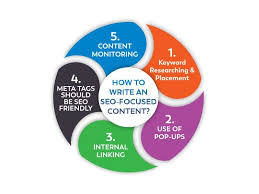The Power of Content Strategy: A Guide to Creating Impactful Content
In today’s digital age, content is king. With the vast amount of information available online, it’s crucial for businesses and individuals alike to have a well-defined content strategy in place. A strong content strategy not only helps you reach your target audience effectively but also sets you apart from the competition.
What is Content Strategy?
Content strategy is the planning, development, and management of content—whether it’s written, visual, or multimedia—across various digital platforms. It involves defining your goals, identifying your target audience, creating valuable and relevant content, and determining how that content will be distributed and measured.
The Benefits of a Strong Content Strategy
Improved Brand Visibility: A well-crafted content strategy can help boost your brand’s visibility online and attract more visitors to your website or social media channels.
Enhanced Audience Engagement: By understanding your audience’s needs and preferences, you can create content that resonates with them and encourages engagement.
Increased Conversions: Relevant and valuable content can drive conversions by guiding users through the buyer’s journey and encouraging them to take action.
Tips for Creating an Effective Content Strategy
- Define Your Goals: Clearly outline what you want to achieve with your content strategy, whether it’s increasing brand awareness, generating leads, or driving sales.
- Know Your Audience: Conduct research to understand your target audience’s demographics, interests, challenges, and preferences.
- Create Valuable Content: Develop high-quality content that provides value to your audience and addresses their needs or pain points.
- Distribute Strategically: Determine the best channels to distribute your content based on where your audience is most active.
- Measure Success: Use analytics tools to track the performance of your content strategy and make data-driven decisions for improvement.
In Conclusion
A well-executed content strategy can be a game-changer for businesses looking to establish a strong online presence and connect with their target audience effectively. By following these tips and staying agile in response to changing trends, you can create impactful content that resonates with your audience and drives meaningful results for your business.
Essential FAQs on Crafting an Effective Content Strategy
- What is content strategy and why is it important?
- How does content strategy differ from content marketing?
- What are the key components of a successful content strategy?
- How can I define my target audience for content strategy?
- What role does SEO play in content strategy?
- How do you measure the success of a content strategy?
- What are some common challenges businesses face when implementing a content strategy?
What is content strategy and why is it important?
Content strategy is a vital component in today’s digital landscape, encompassing the planning, creation, and management of content to achieve specific goals. It serves as a roadmap for delivering valuable and relevant content to the target audience across various platforms. Content strategy is crucial because it not only helps businesses effectively communicate their brand message but also enhances brand visibility, engages the audience, drives conversions, and ultimately contributes to achieving business objectives. By defining clear goals, understanding the audience, creating valuable content, and measuring performance, content strategy plays a pivotal role in shaping successful online presence and driving meaningful results.
How does content strategy differ from content marketing?
Content strategy and content marketing are often used interchangeably, but they serve distinct purposes in the realm of digital content creation. While content marketing focuses on promoting and distributing content to drive profitable customer action, content strategy is more about the planning, creation, and management of content to achieve specific business goals. Content strategy involves defining the target audience, determining what type of content will be most effective, and establishing a framework for consistent delivery. On the other hand, content marketing utilises the content created through a strategic approach to engage with the audience, build brand awareness, and ultimately drive conversions. In essence, content strategy sets the foundation for content marketing by providing a roadmap for creating relevant and valuable content that resonates with the target audience.
What are the key components of a successful content strategy?
When considering the key components of a successful content strategy, several elements come into play. Firstly, defining clear and achievable goals is essential to guide the direction of your content efforts. Understanding your target audience and their preferences is crucial in creating content that resonates with them. Developing high-quality and valuable content that addresses the needs and interests of your audience is another vital component. Strategic distribution across relevant channels, coupled with consistent monitoring and analysis of performance metrics, ensures that your content strategy remains effective and adaptable to changing trends. By integrating these key components seamlessly, businesses can establish a strong foundation for a successful content strategy that drives engagement and delivers results.
How can I define my target audience for content strategy?
Defining your target audience is a crucial step in creating an effective content strategy. To identify your audience, start by conducting thorough research to understand their demographics, interests, behaviours, and preferences. Utilise tools such as analytics data, surveys, and social media insights to gather valuable information about your potential readers or customers. By developing detailed buyer personas that represent your target audience segments, you can tailor your content to address their specific needs and engage them effectively. Remember that a deep understanding of your target audience will not only help you create more relevant and impactful content but also drive better results for your overall content strategy.
What role does SEO play in content strategy?
When considering content strategy, the role of SEO (Search Engine Optimization) is paramount. SEO plays a crucial role in content strategy by ensuring that your content is not only valuable and engaging to your audience but also optimised for search engines to improve visibility and ranking. By incorporating relevant keywords, meta tags, and high-quality backlinks, SEO helps your content reach a wider audience and drive organic traffic to your website. A well-executed SEO strategy can enhance the effectiveness of your content strategy by making it more discoverable and accessible to those actively searching for information related to your industry or offerings.
How do you measure the success of a content strategy?
Measuring the success of a content strategy is essential to understanding its impact and effectiveness. There are various key performance indicators (KPIs) that can be used to evaluate the performance of a content strategy, such as website traffic, engagement metrics (like time spent on page and bounce rate), social media shares, lead generation, conversion rates, and overall return on investment (ROI). By analysing these metrics regularly and adjusting your strategy based on the data gathered, you can determine the success of your content strategy and make informed decisions to optimise future content efforts.
What are some common challenges businesses face when implementing a content strategy?
When businesses embark on implementing a content strategy, they often encounter several common challenges that can hinder their success. One prevalent issue is the lack of clear objectives and goals, making it difficult to create content that aligns with the overall business strategy. Another challenge is maintaining consistency in producing high-quality content regularly, which requires dedicated resources and a well-defined editorial calendar. Additionally, understanding and adapting to changes in audience preferences and search engine algorithms pose ongoing challenges for businesses striving to stay relevant and engaging in the competitive digital landscape. Overcoming these obstacles demands strategic planning, continuous evaluation, and a willingness to adapt to evolving trends in content consumption.




